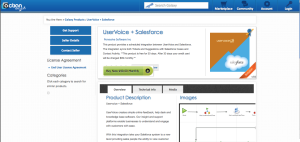After marking my calendar to attend Pervasive’s 2013 Integration World, I had to wonder whether or not Actian’s pending acquisition of Pervasive would be a done deal–or not–by April 14, when the conference was due to kick off.
After all, I figured that if things were still up in the air, I’d probably leave with more questions than answers. Although it seemed pretty clear to me that the combined entity would be able to bring a lot more to the table in the large enterprise big data space, it wasn’t clear to me what it would mean for the merged company’s future in the SMB market.
Evidently, the events team wasn’t sure about whether or not the acquisition would be a done deal in time for the event either, as they had two sets of signage and materials printed up and ready to go for either eventuality.
Fortunately, the acquisition became final on April 11, three days in advance of the event, and the events team got to use the Actian version. And although it’s too soon to expect a roadmap from the freshly combined entity, the event did give me a chance to think about what may be on tap.
Actian Connects with Pervasive
 First, the background. Privately held Actian Corp closed the deal to acquire Pervasive, which had prior to this been publicly traded on NASDAQ, on April 11 for $161.7 million. Under the agreement, Pervasive becomes a wholly owned subsidiary of Actian. In total, the merged company employs about 510 people.
First, the background. Privately held Actian Corp closed the deal to acquire Pervasive, which had prior to this been publicly traded on NASDAQ, on April 11 for $161.7 million. Under the agreement, Pervasive becomes a wholly owned subsidiary of Actian. In total, the merged company employs about 510 people.
Each company has been around a long time and has deep roots in the database world. Actian got its start from a predecessor company named Ingres in the late 1980s, which went through two acquisitions and a divestiture to then emerge as the new Ingres Corporation, best known for Ingres Database, an SQL relational database management system, available in community (open-source) and enterprise versions. On a quest to evolve into a big data company, the company acquired VectorWise, an analytical database in 2010. In 2011, the company rebranded itself as Actian and in 2012, it bought object-store database vendor Versant.
Likewise, Pervasive began as a database company in 1982, with its Btrieve offering. After a few acquisitions, spinouts and name changes, the company became Pervasive Software in 1997, when Btrieve evolved into Pervasive PSQL. In 2003, Pervasive entered the integration business when it purchased Data Junction (now Pervasive Data Integrator). Today, many SMB-oriented ISVs use Pervasive data integration solutions in their offerings. Data Integrator technologies are also at the core of Galaxy Marketplace, which Pervasive launched in 2011 (see Pervasive Puts Its Galaxy Integration Community Into Orbit). In addition, Pervasive jumped into the big data arena, most notably with DataRush, a predictive data analytics engine, in 2006.
In both companies, legacy database products still account for a big chunk of revenues, and have funded expansion to develop and/or acquire the big data solutions that they are targeting to fuel future growth. As noted by Steve Shine, Actian CEO in the press release announcing the deal, that target is to deliver big data solutions for enterprises of all sizes: “Every moment, people, businesses and machines generate explosive volumes and varieties of data leveraging their existing networks and, more increasingly, the cloud. Companies that embrace this data as their most strategic asset will thrive, while those that don’t lose their competitive advantage.”
Giving companies the ability to “Connect, Analyze and Act” is Actian’s corporate mantra. Pervasive gives Actian the strong integration capabilities that it needed to fill out the connect piece of its big data story. Meanwhile, DataRush’s high-powered BI and analytics solutions should significantly beef up analytics and processing capabilities.
Where SMBs Have Fit Into the Story to Date
Small and medium businesses (SMBs) have been vital to Pervasive. The company has relied primarily on indirect channel partners to reach SMBs. ISVs in particular have been integral to its success. It has partnered with vendors such as Intuit, Salesforce, UserVoice and others who sell through embedded integrations and connectors built with Pervasive Data Integrator and with ISVs, such as GlobalShop, EBP, and Abacus, that build their solutions on Pervasive SQL database. A good strategy, as SMBs don’t often have the bandwidth, expertise or resources to tend to the integration plumbing necessary to connect financials, marketing, CRM and other solutions.
 In 2011, Pervasive also introduced Galaxy Integration Marketplace, a portal where users can find integration guidance and buy pre-built integration solutions in Amazon-like fashion. On the flip side, the portal gives integration developers a window into what integrations people are looking for, as well as a lot of very handy tools–including a storefront–to provision and manage products, subscriptions, payment processing, etc.
In 2011, Pervasive also introduced Galaxy Integration Marketplace, a portal where users can find integration guidance and buy pre-built integration solutions in Amazon-like fashion. On the flip side, the portal gives integration developers a window into what integrations people are looking for, as well as a lot of very handy tools–including a storefront–to provision and manage products, subscriptions, payment processing, etc.
Currently, Galaxy has about 100 integration apps, from Freshbooks to Salesforce, which is priced at $25 per month, to integrations that are priced at $5000 or $6000 per year.
Pervasive is also working on a new capability, code-named Maestro, that will have a simple mapping interface so providers can map custom fields on top of pre-built connectors. Again, the Galaxy approach makes it easy for under-resourced SMBs to tackle the complicated integration problem.
On the other hand, Pervasive’s big data offerings, such as DataRush, have pretty much been a large enterprise play, and Actian’s primary focus and customer base has resided with large enterprises to date.
Where Will SMBs Fit in the Future?
Will Actian continue to maintain a strong focus on SMBs? In conversations at Integration World, as well as in the press release, Shine indicated that Actian intends to cover the spectrum from large to small: “Actian’s innovations make it easy for organisations large and small to connect, analyse and act on their fast-changing and fast-growing diverse data assets throughout the entire data lifecycle.”
Furthermore, Pervasive has an established and successful model of working with ISVs to embed and sell through its solutions–a solid approach to reach and serve SMBs, who need integration solutions that they can quickly deploy and from which they can get value. The Galaxy Marketplace complements this approach by adding the value of community insight and new ways to source and purchase integration solutions.
However, Actian will face many challenges as it tries to span from large enterprises to small–especially in increasingly crowded and hyped integration, analytics and big data markets. And, as more SMBs become aware of and educated about what big data is and why they need to have a strategy for it, how will Actian push through the noise and surface to get into consideration in that arena?
Easier said than done–both on engineering and marketing fronts, especially as large customers tend to have a lot more pull than small ones, and the fragmented nature of the market makes SMBs much harder to reach and serve.
Actian will need to make a bold statement. It must double down on engaging SMB-focused developers, SIs and other sell-through partners both within, as well as beyond its current integration ecosystem. If Actian could, for instance, apply low-friction approaches such as Galaxy into other areas, such as analytics, it could prove a powerful play for helping SMBs not only connect, but to also analyze and act on their data once its integrated.
I’ll be watching to see if Actian chooses to make some significant moves in SMB directions as well as in the large enterprise space. Will SMBs be treated as a strategic market focus, or as business as usual? Actian’s decisions will signal whether it intends to pursue a broader play in the SMB market–or not.
